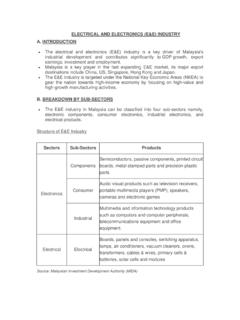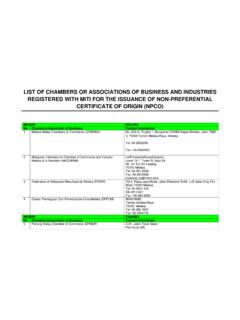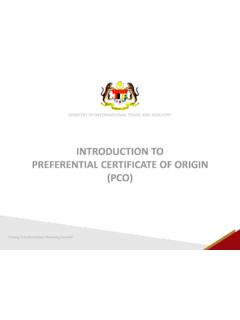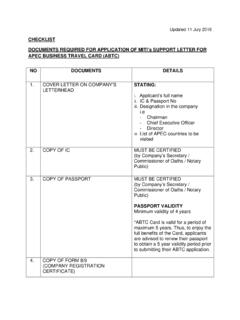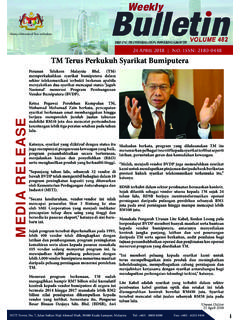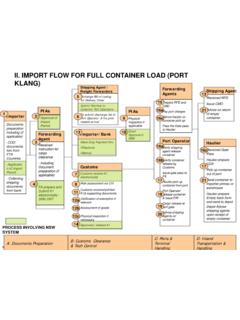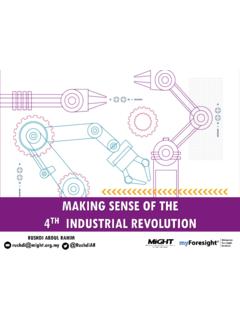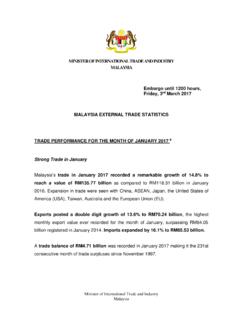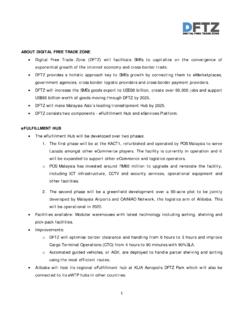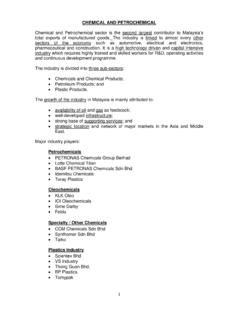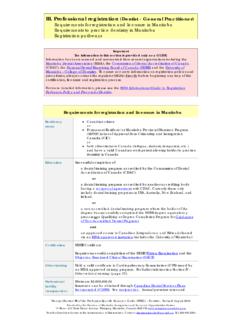Transcription of CONTENT
1 2 CONTENT PART I : Acronym PART II : Terminology PART III : Fact Sheets PART IV : References 3 4 AANZFTA ASEAN-Australia - new zealand - Free trade Area. The Agreement was signed on 27 February 2009 in Thailand. It entered into force on 1 January 2010. ABAC APEC Business Advisory Council - provides business-specific advice to APEC Leaders on implementation of the Osaka Action Agenda (OAA), trade and investment liberalization and facilitation (TILF), economic and technical cooperation (ECOTECH), and other priorities specifically related to the business sector. Membership is composed of up to three senior representatives of the business sector from each member economy. Established in 1995 and formally recognized by the APEC Ministers in 2005 as one of the five categories of delegates to attend APEC official meetings.
2 ABDC Automotive Business Development Committee chaired by MITI and discusses incentive applications under the Multi Sourcing Parts Progamme(MSP) and Industrial Linkage Programme (ILP) schemes for the automotive industry. ABTC APEC Business Travel Card - allows business travelers pre-cleared, facilitated short-term entry to participating member economies. Card holders benefit from faster immigration processing on arrival via access to fast-track entry and exit through special APEC lanes at major airports in participating economies. All 21 APEC member economies participate in the ABTC scheme, 18 namely Australia; Brunei Darussalam; Chile; People s Republic of China; Hong Kong, China; Indonesia; Japan; Republic of Korea; Malaysia; Mexico, new zealand ; Papua New Guinea; Peru; Philippines; Singapore; Chinese Taipei; Thailand and Viet Nam are full members while Canada, the United States and Russia are transitional members.
3 AD Automotive Dialogue - serves as a forum for APEC member economy officials and senior industry representatives to work together to map out strategies for increasing the integration and development of the automotive sector within the region. Participants discuss the current status of the automotive sector in the Asia-Pacific region, identify barriers to growth, and develop effective cooperation mechanisms for APEC economies to address and reduce these impediments. The first Automotive Dialogue was held in Bali, Indonesia, in July 1999. Sectoral Division of MITI represents Malaysia at AD. AELM APEC Economic Leaders Meeting the annual meeting of the Leaders of the member economies, at which the policy agenda is set for APEC. Leaders consider 5 proposals and recommendations from Senior Officials Meetings (SOM), Sectoral Ministerial Meetings, APEC Business Advisory Council (ABAC), and Joint Meetings of Ministers for Foreign Affairs and Ministers Responsible for Trade (AMM), and issue Leaders Statements on future development directions for the years to come.
4 The first AELM was held in 1993 at Blake Island, United States. The Honorable Prime Minister of Malaysia attends the AELM annually. AEC ASEAN Economic Community - Is one of the three main pillars for the establishment of the ASEAN Community 2015 and future economic integration. AEM ASEAN Economic Ministers - The AEM includes ten ASEAN Member States Economic Ministers. The AEM meets twice a year. AFTA ASEAN Free Trade Area - It was agreed in 1992 with main objective to create a single market and an international production base in ASEAN. AFAS The ASEAN Framework Agreement on Services (AFAS) - was signed by ASEAN Economic Ministers on 15 December 1995 in Bangkok, Thailand. It aims to enhance cooperation to improve the efficiency, competitiveness and supply of services, and liberalise further the trade in services among ASEAN Member State.
5 The 12 broad sectors covered for liberalization in ASEAN are: Business Services; Communication Services; Construction and Related Engineering Services; Distribution Services; Educational Services; Environmental Services; Financial Services; Health Related and Social Services; Tourism and Travel related Services; Recreational, Cultural and Sporting Services; Transport Services; and other Services not included elsewhereTo date, all ASEAN Member States, including Malaysia has committed nine Packages of Services Liberalization commitments under AFAS. AJCSD The ASEAN-Japan Chemical Safety Database - free database which includes chemical regulatory information, GHS classification results, risk and hazard information, etc. AKFTA ASEAN Korea FTA - Korea is the second Dialogue Partner with whom ASEAN has forged a free trade agreement.
6 In 2005, ASEAN and Korea signed the Framework Agreement on Comprehensive Economic Cooperation (Framework Agreement), and subsequently, signed four (4) more agreements that form the legal instruments for establishing the ASEAN-Korea Free Trade Area (AKFTA). AMM APEC Ministerial Meeting a joint meeting of Ministers of Foreign Affairs and Ministers Responsible for Trade of APEC member economies organized annually. 6 Meeting takes place right before the APEC Economic Leaders Meeting (AELM). At this Meeting, Ministers give their assessments and evaluations of APEC cooperation in the present year, endorse recommendations on cooperation from Senior Officials Meetings (SOM) and report to AELM for consideration and approval. MITI Minister participates this meeting under the capacity of Minister Responsible for Trade.
7 APEC Asia-Pacific Economic Cooperation - a forum for 21 Pacific-rim member economies that seeks to promote open trade and practical economic cooperation throughout the Asia-Pacific region. Cooperation is based on three pillars: trade and investment liberalization, business facilitation, and economic and technical cooperation. The primary goal is to support sustainable economic growth and prosperity in the region..Established in 1989, membership comprises Australia; Brunei Darussalam; Canada; Chile; People s Republic of China; Hong Kong, China; Indonesia; Japan; Republic of Korea; Malaysia; Mexico; new zealand ; Papua New Guinea; Peru; Philippines; Russia; Singapore; Chinese Taipei; Thailand; United States; and Viet Nam. APEC accounts for over 1/3 of world population, nearly 54% world GDP and 44% world trade.
8 AP Approved Permit - is an import and export license issued by the Permit Issuing Agencies (PIAs) based on the Customs Act 1967. ASEAN-6 Is an acronym refers to the six advance ASEAN Member States namely Brunei Darussalam, Indonesia, Malaysia, Philippines, Singapore and Thailand. ASEAN Association of Southeast Asian Nations - the aims and purposes are to accelerate economic growth, social progress and cultural development; to strengthen cooperation and mutual assistance; and to ensure peace and stability in the region (Bangkok Declaration). ASEAN comprises 10 countries in Southeast Asia, including the five founding members, namely Indonesia, Malaysia, Thailand, Philippines, Singapore, and five others: Brunei, Vietnam, Laos, Myanmar and Cambodia.
9 Established on 8 August 1967. ASEAN-BAC ASEAN Business Advisory Council - was established in 2003. The ASEAN-BAC assumes a strategic role in facilitating engagement between the private and public sector. Each ASEAN Member State is represented by three private sector members, including one from SMEs. ASEM Asia-Europe Meeting - ASEM is an exclusively Asian European forum to enhance relations and various forms of cooperation between the 53 partners: 51 countries and 2 regional organisations namely the European Union and ASEAN Secretariat. 7 ASEC ASEAN Secretariat - ASEC s basic function is to provide for greater efficiency in the coordination of ASEAN organs and for more effective implementation of ASEAN projects and activities. The economic pillar of ASEC is headed by Deputy Secretary General of ASEAN for ASEAN Economic Community.
10 ATIGA ASEAN Trade in Goods Agreement - The ATIGA was implemented in 2010 as to replace the old CEPT Scheme which was established back in 1993. The ATIGA is a comprehensive agreement for trade in goods in ASEAN which includes trade facilitation measures and safeguard measures provisions. ATR ASEAN Trade Repository - provides a single point of access to all the trade-related information of ASEAN Member States. The ATR is an ASEAN-level IT interface linked by means of hyperlinks to a series of interoperable National Trade Repositories (NTRs) that provide and maintain the national-level trade related information and the actual contents. ATF Authorised Treatment Facility - are sites that have been licensed to accept end of life vehicle (ELV) and are able to comply with the requirement of ELV regulations.
